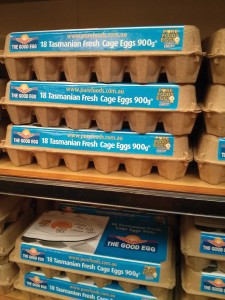An environmental case for less meat on the table

In Australia, labelling for egg cartons must state if the eggs come from caged hens. Photo by Terri Chu
By Terri Chu
With the holidays behind us and some of us going vegetarian until we recover from the gluttony, it is a good time to reflect on the environmental and social impact of the meat on our table.
As the environmental atrocities related to our food chain become better known, there are organizations working in ad hoc ways to educate people on those offences. California has popularized “meatless Mondays” in an attempt to reduce (way too high) meat consumption, as it is far more environmentally damaging to feed the world on meat than on vegetables (or insects). Would it be too much to ask to see both levels of government confront big agriculture?
In the 1990s, the Chrétien Liberals boldly took on big tobacco, requiring that companies include grotesque images on cigarette packages. History would prove this to be an enterprising move and countries around the world have since adopted a similar approach in an effort to curb smoking. This was when Canada took decisive actions beyond smiling words. Canada became a world leader and can do so again. Given the amount of information we already have about animal cruelty in commercial meat farming, I think poignant reminders will go a long way toward curbing our consumption of animal products.
If we brought food labelling in line with cigarette labelling, meat consumption (and the carbon emissions that go with it) would likely plummet. Imagine your next pack of bacon with an image of pigs in cages and the text “This pig was raised in cages that produce xx amount of carbon per pound”. Since some dieticians believe Canadians eat about three times more meat than the average daily recommendation, this could also have a good side effect for the public health care bill.
A friend and I were grocery shopping in Tasmania. She took a look at the cheap eggs on offer, spotted the word “caged” and said “that’s why they’re so cheap”, and moved on past them.
Caged eggs in Australia must be labelled as such (not just without the words “organic” or “free range” or “natural”…whatever that means).
Egg producers are aggressively advertising lately and a friend pointed out the conspicuous lack of hens in the photos. Why aren’t there pictures of hens? It doesn’t take a genius to figure out that they are mostly in battery cages in conditions we would rather be blind towards. A disclaimer stating “These eggs were laid by hens in battery cages” on the packaging could do a lot for how we treat our cheap food.
Labels paralleling cigarette packaging would certainly be a salient reminder of the cost of cheap food. There would still also be a market for cheap food, but my hope is that it would shift demand towards small, more humane farmers who let their pigs roam free.
Please don’t mistake me for a hog-hugging, vegan hippie. I believe meat substitutes are often more environmentally (and health) harming than eating meat in some cases, as substitutes that resemble animal products are often made from petrochemicals. I have yet to see a good environmental (let alone health) case for them.
As we learned with cigarettes, consumer information is half the battle. When the consumers are informed, they make different decisions than when they aren’t. The federal and provincial Liberals really do have an opportunity to work together and stand up to big agriculture and help Canadians make more informed food and environmental choices. Meeting our Paris Agreement obligations means more than just going after big polluters; Canadians also need to know the impact of their shopping decisions if they are to contribute meaningfully.
Terri Chu is an engineer committed to practical environmentalism. This column is dedicated to helping the community reduce energy, and to help distinguish environmental truths from myths. Send questions, comments, and ideas for future columns to terri.chu@ whyshouldIcare.ca.
